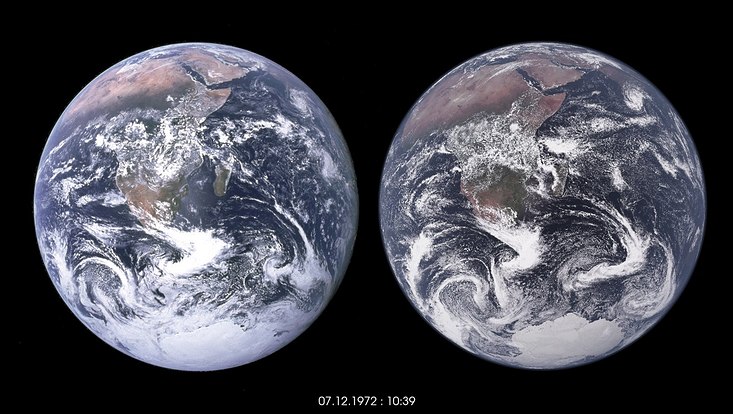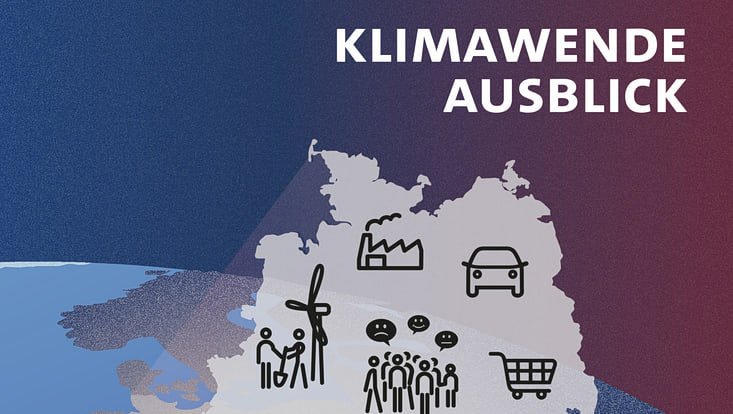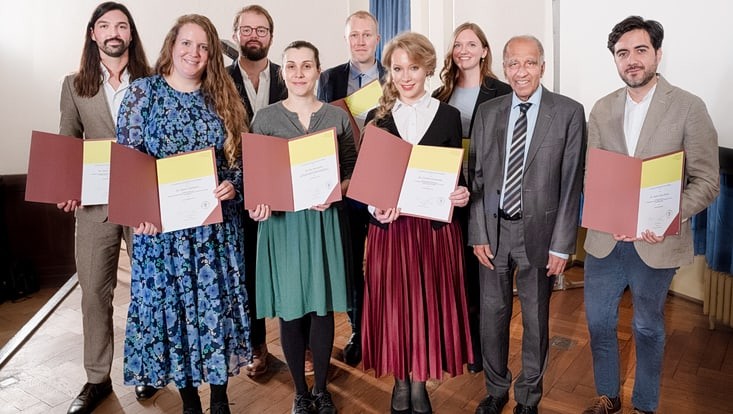and Society (CLICCS)
EVE - Earth Virtualization EnginesAn international federation of centers of excellence to empower all people to respond to the immense and urgent challenge of climate change
15 August 2023, by Max-Planck-Institut for Meteorology

Photo: MPI-M, DKRZ, NVIDIA
The following statement is the result of the Berlin Summit for EVE, an international conference that took place in June 2023, signed by 141 leaders from the fields of climate science, climate services, technologies and sustainable devleopment. The aim of EVE, the Earth Virtualization Engines initiative, is to develop tools for detailed climate information. For example, forecasts for the entire world should be made freely available at 1-kilometer resolution. Combining the expertise from science, technology and artificial intelligence, this vision is moving into the realm of possibility. Chair and organizer of the Berlin Summit for EVE is CLICCS researcher Prof. Björn Stevens from the Max Planck Institute for Meteorology. The Cluster of Excellence CLICCS and researchers from the University of Hamburg are participating in the project.
Every day, more and more people are waking up to the consequences of Earth's changing climate. Changes in weather, water, and ecosystems are catching communities unprepared, and scientists by surprise. These changes are highlighting how little we know about basic questions, such as for whom the monsoon rains may falter, or even fail; or more generally, whether warming is causing shifts in atmosphere and ocean circulations and how these may connect to more frequent and intense heatwaves, wildfires and flooding. Climate change is also exposing a fundamental injustice, whereby those least responsible are impacted the most. Efforts to know more, and plan better, are severely under-resourced, and inequitably distributed, deepening both the sense of anxiety and the injustice. This increases the disruptive potential of climate impacts for all. EVE responds to this new reality.
EVE envisions a world where everyone knows how climate and climate change affect them, and where this knowledge empowers them to act. By generating entirely new and inherently better sources of information, EVE strives to catalyze a change in the broader ecosystem of data and services to deliver a just, equitable and scientifically grounded basis for action.
EVE will be made up of international centers of excellence, each accessing outstanding computational and data handling capabilities, and each embedded within the rich and expanding landscape of climate-related data, experiences, and information. This will enable EVE to fill a data space with climate projections of much greater fidelity, with local granularity, globally. And to link these, through a digital commons, to data describing the physical, biological, chemical, and social dimensions of the Earth system. EVE's digital commons will efficiently expose data to new (e.g., generative AI, augmented reality) methods of analysis and proactive information production. This will enable stakeholders to construct and interact with their own climate scenarios. EVE's technical ambition will strengthen the capabilities of all sorts of communities to command new technologies – built on scientific excellence, transparency, and openness across disciplines – to rise to the specific challenges climate change poses for them.
EVE will add modelling capacity beyond the reach of most countries, let alone existing modelling centers. This capacity is urgently needed to improve model fidelity, to assess impacts, and to integrate observations, globally. EVE's digital commons will provide access to software and infrastructure-as-a-service that would otherwise not be available at the necessary scale, nor aligned with emerging technologies. Through a commitment to international cooperation and capacity development, EVE's centers of excellence will extend, accelerate, and further open the generation of climate information of unprecedented quality and salience to enhance climate services globally.
Each of EVE's centers of excellence will:
- apply and advance the best available science to continuously grow and refresh a data space with small ensembles of km-scale multi-decadal global climate projections, juxtaposed with larger ensembles at coarser granularity;
- establish and maintain equitable access to a space of interoperable data and software, through open and secure protocols aligned to global standards and conventions, as part of an emerging ecosystem of planetary data;
- support and encourage the innovative uses of data to generate information particularly on local climate impacts and interactively expose it to users, especially those that would not otherwise have access, and to develop standards and trust in their global use;
- cooperate with existing operational climate services and practitioners at all levels, as well as research infrastructures and programmes in the natural, information and social sciences, to amplify both their own and EVE's impact;
- include a strong component of well-tailored capacity development, outreach, and exchange, to enrich EVE's with local knowledge, and to bridge divides to train and employ new developers and users of climate information globally.
Each EVE center of excellence will require experts to maintain and advance state-of-the-art computing and data facilities, to improve its models (physically and computationally), to support training and capacity development, and to engage with users to enlarge the public sphere of climate information. To meet these requirements, alongside EVE's computing and data demands, will require a funding rate of about e300 million per year per center. Three to five centers should be sufficient to fill the data space of future projections, and at the same time extend access to, and engage, communities globally in using it. Global governance is key to the creation and sustainability of EVE. This could be in the form of an international treaty, or through coordination of self-governed centers by the WMO, UNEP or other inter-governmental organizations. Independent of the governance model, EVE will be charged with maintaining consistent and open delivery of value to the widest possible user community and to support constructive innovation through scientific excellence.
By comparison with the climate-change impacts it seeks to predict, EVE is asking for a tiny investment. All the more so that it takes advantage of an enormous opportunity. And that is to confidently open the door to new worlds. Worlds where water managers in Bhutan can, with confidence and trust, interactively explore the interplay between adaptation strategies and different scenarios of global climate change. Where agriculturalists in northern India, or managers of blue-carbon mangrove stocks in Bangladesh, can anticipate the implication of Bhutan's choices; and where climatologists working in Cape Town can investigate how it all couples back to influence weather, water and ecosystems globally. EVE will allow impact communities, who link ecological changes to patterns of weather and water, to leverage ever richer descriptions of present and past climates to scenarios for the future, to develop strategies for building resilience. EVE's ability to bring forth such worlds will come as much from the fidelity of its new models, as from the power of its new technologies, as from its ability to equitably engage those who need its information most.
Find the complete statement with frequently asked questions and the list of signatories here (PDF).


